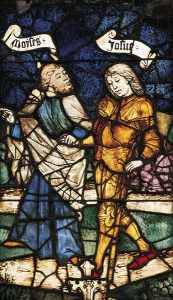Joshua in the Bible
Bible Review‘s Supporting Roles by Elie Wiesel
Elie Wiesel February 21, 2022 23 Comments 87885 views
Read Elie Wiesel’s essay on Joshua in the Bible as it originally appeared in Bible Review, December 1998. The article was first republished in Bible History Daily in 2013.—Ed.


Ever modest, Joshua hangs back as Moses leads him by the hand in this 15th-century stained-glass panel from the Church of St. Lawrence in Nuremberg, Germany. For Elie Wiesel, Joshua is a sad, troubled character despite his successes in battle and his unfailing devotion to Moses and God. Lacking experience in war, Joshua is sent by Moses to fight the Amalekites; when Joshua succeeds Moses, he leads the bloody conquest of Canaan. Yet this reluctant warrior retires to live out his days with only lonely memories, and when he dies, he is buried without the pomp and circumstance usually afforded a hero. Wiesel notes an immense sadness about Joshua in the Bible, a sadness caused perhaps by the noise and fury of Joshua’s life. Image: Sonia Halliday.
Joshua, the perfect disciple. Obedient and humble. The man whose devotion to his master can serve as an example to all. God’s chosen, just as Moses had been. The servant become leader, whom God and Moses do not cease to encourage—so much so that we wonder why he had such a need. Is it because, in his humility, Joshua felt so inferior to Moses that he believed himself inadequate, unqualified and even unworthy to complete a task that only his master was capable of completing satisfactorily? Joshua will inherit political and religious authority from Moses but not his prophetic style. God accomplished miracles for Joshua. He went so far as to upset the laws of nature by ordering the sun to stand still, but Joshua’s speech lacks the magic that emanates from the words of the prophets.
A great melancholy emerges from his life story, a sadness that stays with him to the end of his days. Is it because his life unfolds in the midst of noise and fury?
In truth, Joshua makes me afraid. His personality is too dark, involved in too many battles, too many confrontations. The man of blood and glory, he is the one sought out when someone is needed to throw himself into the fray, to push back or attack the enemy. To read his book is to move forward into the ashes, among disfigured corpses.
In the Scriptures, his position is assured. The image he projects is always without fault. Admirable is his devotion to Moses: Always stationed at the entrance to his tent, Joshua is the guardian of the door. He is at Moses’ side only when he is called. Never would he disturb Moses in his solitude.
Only one incident could, without surprising us, have a negative connotation: Joshua learns that two young men, Eldad and Medad, are walking around the encampment, prophesizing to the people. Annoyed by their lack of respect, Joshua hastens to inform Moses and suggests that he imprison them. But Moses, more humane and more generous than ever, rebukes him: “Are you so concerned about my honor that you think you need to protect me? May all the people become prophets!” (Numbers 11:29). That said, Moses always has confidence in Joshua, and we do too. He carries out the missions entrusted to him scrupulously, with efficiency and devotion—that is certain. Are they dangerous? Joshua knows neither fear nor doubt. When Moses names him military commander and sends him to fight against the Amalekites, he goes.
What has he done to learn how to command? No matter. He confronts the enemy, and he wins the battle. When Moses orders him to join the spies sent to cross the Canaanite frontier and bring back a precise account of the military and economic capacities of the land promised to the people of Israel, he goes. The questionnaire the scouts receive from Moses reads like an espionage document.
The commander in chief wants to know “whether the population is strong or weak, few in number or many, if the country is good or bad, if the towns are open or fortified, the land fertile or barren, if there are trees or not” (Numbers 13:18–20). The expedition takes 40 days. The text gives us the opinion of the majority and that of the minority: ten against two. Who are the ten? Eminent heads of the tribes of Israel. Their accounts are desperate and hopeless: They say the country runs with milk and honey, but the people who live there are powerful. They are stronger than we are, the towns are large and fortified, the people are gigantic. In their eyes, and in ours, we are no more than grasshoppers. The ten make up an overwhelming majority, but it is the minority of two who carry the day. Joshua, head of the tribe of Ephraim, and Caleb, head of the tribe of Judah, see things differently. Their report is optimistic. Reflecting God’s design, their view prevails—but at a price. Terrified, the people rise up with cries and lamentations against Moses and Aaron: “If only we had died in the land of Egypt…” In vain, Joshua and Caleb try to reason with and to encourage the demoralized Israelites. The more enraged among them attack the two and are ready to stone them. That overwhelming, depressing day will remain marked in the collective memory of Israel by the punishment imposed: It is the moment when God decides that of all those who came out of Egypt, only Joshua and Caleb shall enter the Promised Land. The ten skeptical scouts will die soon after, and the others rescued from slavery in Egypt will perish in the desert.


In the book that bears his name, Joshua impresses us with his harshness: it depicts a violence, even a thirst for violence, that is found nowhere else. The conquest of the land of Canaan occurs with fire and blood. Too much destruction at every turn. The only moment of tenderness in this account is the story of Rahab in Jericho. The brave and generous prostitute saves Joshua’s spies. In exchange, legend gives her Joshua as bridegroom.
This story is not in his official biography, which, moreover, is very meager. It is only in the midrashic literature that there is interest in Joshua’s private life. His father was a just man, but childless. Nun passed his days praying to God for a son, and his prayer was answered. Moses was still alive, but very old, when Joshua was teaching the Law to the people. One day, Moses came to listen. He remained standing with the crowd. Joshua saw him and, overcome by remorse, cried out in distress. Then a celestial voice was heard: The time has come for the people to receive the teaching of Joshua. Brokenhearted, Joshua submitted. It is because he respected and venerated his Master; he loved him. Of all his qualities, it is his attachment to Moses that moves us the most.
According to the legend, Joshua was then married. He had children: only girls. Having fulfilled the mission that God and Moses had entrusted to him, Joshua retired and lived in the isolation of memory. He was old, the text tells us, and the country rested from the wars.
He died alone and was buried in a place called Har gaash—a kind of angry mountain, a sort of volcano. The Talmud comments that this illustrates the ingratitude of the people toward their leader. Why was the mountain angry? Because God, in his wrath, was ready to punish his people. Why the rage? Because no one took the trouble to come to Joshua’s funeral. Everyone was too busy. Some were cultivating their gardens, others their vineyards; still others watched over their fires.
Unbelievable, but how true: In war, Joshua had been their leader. Afterwards, the people no longer needed him, to the point that no one came to pay him their final respects, to which all mortal men are entitled, whoever they might be.
How can one not feel sadness when reading Joshua’s story?
Translated by Anne Renner.
The Book of Joshua presents the destruction of the city of Hazor. Read more about the destruction in “Hazor Excavations’ Amnon Ben-Tor Reveals Who Conquered Biblical Canaanites” and “Scorched Wheat May Provide Answers on the Destruction of Canaanite Tel Hazor.”
The author of more than 30 novels, plays and profiles of Biblical figures, Elie Wiesel received the Nobel Peace Prize in 1986. This online publication is adapted from Wiesel’s article “Supporting Roles: Joshua,” which was published in Bible Review in December 1998. The article was first republished in Bible History Daily on August 9, 2013. At the inception of Wiesel’s Supporting Roles series in Bible Review, BAS editors wrote:
We are pleased—and honored—to present our readers with the first of a series of insightful essays by Elie Wiesel, the world-renowned author and human rights advocate. Wiesel is best known for his numerous books on the Holocaust and for his profiles of Biblical figures and Hasidic masters. In 1986, he was awarded the Nobel Peace Prize. His occasional series for BR will focus on characters in the Bible that do not occupy center stage—those who play supporting roles.
Read an interview BAR Editor Hershel Shanks conducted with Elie Wiesel and Biblical scholar Frank Moore Cross, republished from BAR, July/August 2004 >>
More “Supporting Roles” by Elie Wiesel in Bible History Daily:
Cain and Abel World-renowned author and Nobel Peace Prize winner Elie Wiesel reflects on the Biblical figures Cain and Abel in a Supporting Roles column for Bible Review.
Seth With Adam’s death, Seth became the patriarch of the first family. With the death of his brothers Cain and Abel and of Cain’s descendants, Seth became progenitor of the rest of the human race.
Aaron Aaron, number two in the epic that recounts the liberation of the Jewish people from slavery in Egypt. He is a man of peace. He succeeds at everything.
Jethro Read the article by Nobel Prize recipient Elie Wiesel as it appeared in Bible Review.
Become a Member of Biblical Archaeology Society Now and Get More Than Half Off the Regular Price of the All-Access Pass!
Explore the world’s most intriguing Biblical scholarship
Dig into more than 9,000 articles in the Biblical Archaeology Society’s vast library plus much more with an All-Access pass.



